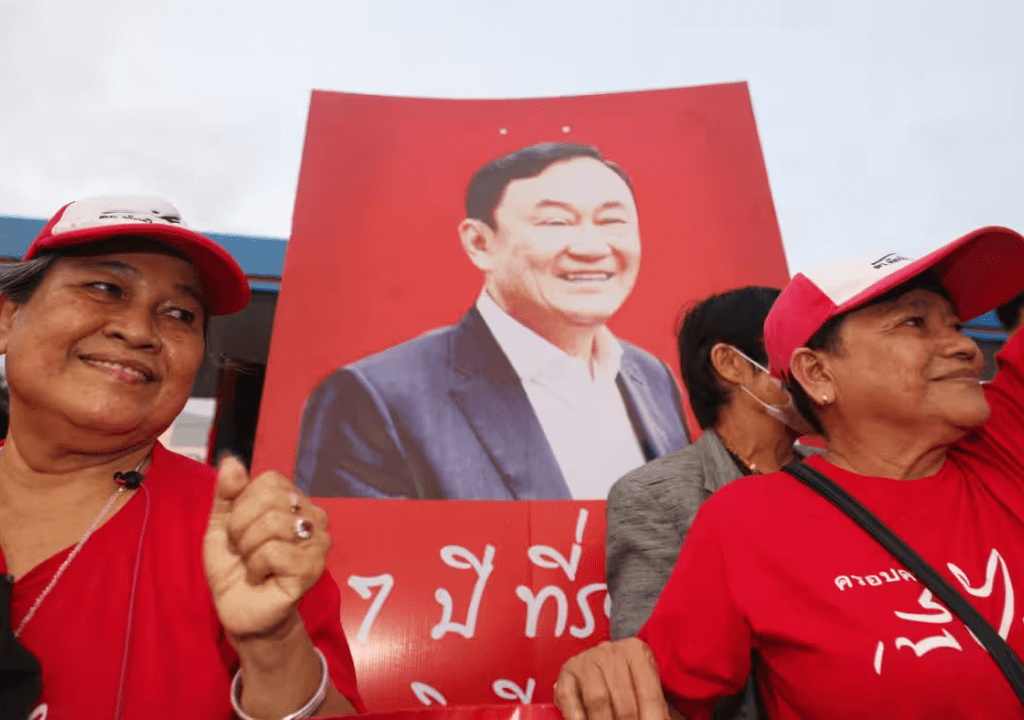In a surprising turn of events, Thailand’s justice minister has announced the impending release of Thaksin Shinawatra, the nation’s former prime minister currently serving time in prison. This development unfolds six months after Thaksin’s return from a self-imposed exile. Thaksin was originally given an eight-year sentence in August of the previous year due to charges of corruption and abuse of power, but King Maha Vajiralongkorn reduced it to just one year.
Srettha, a member of the Pheu Thai Party led by Paetongtarn Shinawatra, the youngest daughter of Thaksin, broke the news. Following the May elections, in which the progressive Move Forward Party won the majority of votes but was prevented from taking office by powerful groups allied with the military and traditional elite, the Pheu Thai Party emerged winner. This political environment in Thailand has become even more complicated as a result of this most recent event. The link between the military and the ruling Pheu Thai party is now solidified. Additionally, the military can take more serious action against Pita, the current populist leader, and his Move forward Party.
In the current Thai political landscape, a complex dynamic unfolds as both populist leaders and the authorities find themselves in opposing positions. A populist figure, advocating for systemic change, is navigating a relentless stream of legal challenges, employing the typical lese majeste tool. Concurrently, after years of detainment and exile, a former prime minister pivotal in reshaping the nation’s authority is on the brink of release. This marks a momentous development as Thaksin Shinawatra, the former prime minister, seeks liberation from imprisonment, having been a target of the country’s perilous lese majeste laws and accusations of dictatorship.
The intrigue deepens as the military authority takes substantial actions against Pita, the current focal point of their attention, facing the looming threat of a party ban. Pita’s party holds the majority in the Thailand legislative assembly. The recent release of Thaksin, who once found himself in a similar predicament, sparks curiosity, considering his party’s prior banishment and his enduring political exile. The prevailing perception suggests that the authority’s heightened measures against Pita and the Move Forward Party are strategically aimed at garnering support from the populace, predominantly in favor of Pita.
On Tuesday, Justice Minister Tawee Sodsong disclosed that the 74-year-old, renowned for his past ownership of Manchester City, would be among 930 prisoners granted early release. Thaksin qualifies for release after a six-month period due to his critical health condition and age exceeding 70, as outlined by Sodsong. While the specifics of his release remain unclear, there are expectations that monitoring measures, possibly including an ankle tag, and travel restrictions may be imposed. Thaksin’s return to Thailand aligns with his Pheu Thai party’s resurgence to power, in collaboration with pro-military factions, prompting speculation about a potential behind-the-scenes agreement influencing the reduction of his prison term.
Thaksin Shinawatra was the inaugural prime minister of Thailand to serve a full term, leaving an indelible mark on the nation’s modern history. The former prime minister held the position from 2001 to 2006, and after being absent from the political arena since his 2006 ousting, he is making a comeback to Thailand after a hiatus of over 15 years. His leadership, widely considered distinctive, was characterized by a plethora of noteworthy policies that set him apart from his predecessors. These policies encompassed various domains such as the economy, public health, education, energy, social order, drug suppression, and international relations, marking a departure from the norm. Notably, Thaksin secured re-election once during his tenure. Among his most impactful initiatives were the reduction of rural poverty and the introduction of universal healthcare. These measures garnered previously overlooked support from the rural poor, particularly in the populous northeast region of the country.
Thaksin’s cabinet comprised a diverse coalition, including academics, former student leaders, and past leaders of the Palang Dharma Party. Figures like Prommin Lertsuridej, Chaturon Chaisang, Prapat Panyachatraksa, Surapong Suebwonglee, Somkid Jatusripitak, Surakiart Sathirathai, and Sudarat Keyuraphan were instrumental in his government. Traditional regional power brokers also aligned themselves with his administration.
Despite these achievements, Thaksin’s government faced mounting accusations of dictatorship, demagogy, corruption, conflicts of interest, human rights offenses, undiplomatic behavior, exploitation of legal loopholes, and a confrontational stance towards a free press. As a highly controversial leader, he became the subject of numerous allegations, including lese majeste, treason, usurpation of religious and royal authority, asset sales to international investors, and religious desecration.
Rumors are circulating that Thaksin Shinawatra’s imprisonment, which commenced on August 22 last year, might conclude as early as this weekend, sparking discussions in local media. Thaksin continues to wield significant influence, stirring controversy in the nation. Since 2008, living in exile to evade legal charges, he has maintained impact by sharing viewpoints on social media and engaging in discussions on platforms. Despite his physical absence, political parties aligned with him dominated recent elections, with Move Forward, a pro-democracy party, emerging as the leading vote-getter.
Upon his return to Bangkok, Thaksin received a hero’s welcome from supporters, making a poignant public gesture by prostrating himself before a portrait of the king at the airport. Recently, the former telecoms tycoon faced lese-majesty charges related to comments made almost a decade ago in South Korea. The outcome of the case remains uncertain, but Thaksin vehemently denies the charges and has written to the attorney general, seeking fair treatment.
In the current landscape, Thaksin’s potential release signifies the authorities’ intent to bolster the Pheu Thai party, establishing a connection between the royal and government spheres to secure widespread support. The clear implication is that further measures will be taken against Pita and the Move Forward Party. The authorities have unequivocally identified Pita and the New Forward Party as their primary targets, signaling a strategic alignment with Thaksin and the Pheu Thai Party.








